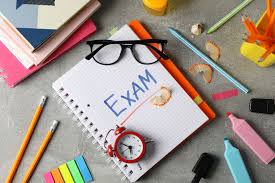Tips for Studying Effectively for Exams
Exams can be stressful, but with the right study techniques, you can prepare effectively and perform well. Whether you’re in high school, college, or preparing for a professional exam, having a solid study plan can make a significant difference. Here are some practical tips to help you study efficiently and retain information better.
1. Create a Study Plan
Having a well-structured study plan ensures that you cover all necessary topics without last-minute cramming.
How to create a study plan:
- List all subjects and topics that need to be covered.
- Set realistic study goals and allocate specific time slots for each subject.
- Break large topics into smaller sections for easier understanding.
- Prioritize difficult subjects and focus more time on them.
Using a planner or digital apps like Google Calendar, Notion, or Trello can help you stay organized.
2. Find Your Ideal Study Environment
Your study environment plays a crucial role in how well you focus and absorb information.
Tips for an ideal study space:
- Choose a quiet and distraction-free location (library, study room, or a quiet café).
- Keep your desk clean and organized to enhance concentration.
- Ensure good lighting to reduce eye strain.
- Use noise-canceling headphones or play soft instrumental music if noise distracts you.
3. Use Active Learning Techniques
Active learning helps retain information better than passive reading.
Effective study techniques:
- Teach the material to a friend or family member as if you were the teacher.
- Use flashcards to memorize key terms and definitions.
- Take handwritten notes while studying to improve retention.
- Use mnemonics and acronyms to remember complex information.
- Summarize what you’ve learned in your own words.
4. Practice with Past Papers and Mock Tests
Practicing past exam papers helps familiarize you with the exam format and improve time management.
How to use past papers effectively:
- Time yourself while answering to simulate real exam conditions.
- Identify commonly repeated questions.
- Review your answers and understand mistakes to improve weak areas.
Websites like Khan Academy, Coursera, or your school’s online portal may provide useful past papers.
5. Take Regular Breaks
Studying for long hours without breaks can lead to burnout and reduced efficiency.
The Pomodoro Technique:
- Study for 25-50 minutes.
- Take a 5-10 minute break after each session.
- After every 4 study sessions, take a longer 20-30 minute break.
Breaks help refresh your mind and improve overall concentration.
6. Stay Healthy and Hydrated
A healthy mind needs a healthy body.
Health tips for better studying:
- Eat nutritious meals (fruits, vegetables, nuts, and protein-rich foods).
- Drink plenty of water to stay hydrated and maintain focus.
- Get enough sleep (at least 7-8 hours) to retain what you study.
- Exercise regularly to boost blood circulation to the brain.
7. Avoid Procrastination
Procrastination can cause unnecessary stress and poor exam performance.
How to overcome procrastination:
- Set clear and achievable study goals.
- Use the “5-minute rule” – start studying for just 5 minutes, and it will be easier to continue.
- Remove distractions (social media, TV, and unnecessary notifications).
- Use study apps like Forest or Cold Turkey Blocker to stay focused.
8. Join a Study Group
Studying with others can provide motivation and new perspectives.
Benefits of study groups:
- You can discuss complex topics and learn from peers.
- Group studies keep you accountable and reduce procrastination.
- Explaining concepts to others helps reinforce your own understanding.
Make sure the group stays focused and does not turn into a social gathering!
9. Use Digital Learning Resources
Take advantage of online platforms to enhance your learning.
Useful online study resources:
- YouTube – Video tutorials for complex subjects.
- Khan Academy – Free lessons on various subjects.
- Quizlet – Create flashcards for better memorization.
- Grammarly – Helps improve writing and essay skills.
These platforms can provide additional explanations and practice exercises.
10. Stay Positive and Manage Stress
A positive mindset can boost confidence and reduce anxiety before exams.
Stress management tips:
- Practice deep breathing and meditation to stay calm.
- Listen to motivational podcasts for inspiration.
- Avoid last-minute cramming, as it increases anxiety.
- Believe in yourself! Confidence plays a big role in performance.
Frequently Asked Questions – FAQs
In this section, I will provide you with FAQs and answers on “Tips for Studying Effectively for Exams”. Keep on reading friend.
1. How many hours should I study per day for exams?
It depends on your learning style and schedule. Ideally, studying 3-5 hours a day with breaks works well for most students. Focus on quality over quantity — active learning for a few focused hours is more effective than passive reading for long stretches.
2. When should I start studying for an exam?
It’s best to start studying at least 3-4 weeks before your exam. For bigger exams, like finals or board exams, starting 2-3 months in advance can give you enough time to cover everything without rushing.
3. What is the best way to memorize information?
Some effective memorization techniques include:
- Flashcards for quick recall.
- Mnemonics and acronyms for complex concepts.
- Spaced repetition (revisiting material at intervals).
- Active recall (testing yourself without looking at notes).
Experiment with different methods to see what works best for you!
4. How do I avoid getting distracted while studying?
To stay focused:
- Turn off notifications or use apps like Forest to block distractions.
- Study in a quiet place with minimal interruptions.
- Try the Pomodoro technique (study for 25-50 mins, then take a short break).
- Set specific goals for each study session.
5. What should I do if I don’t understand a topic?
If you’re struggling with a concept:
- Break it down into smaller parts and tackle them step by step.
- Watch tutorial videos on platforms like YouTube or Khan Academy.
- Ask for help from a teacher, classmate, or tutor.
- Join a study group to discuss and learn collaboratively.
Conclusion
Studying effectively is not about how many hours you put in but how well you utilize your time. By following these tips, you can improve concentration, retain information better, and perform well in exams.
Start early, stay consistent, and trust your preparation. Good luck with your exams! 🎓📚






